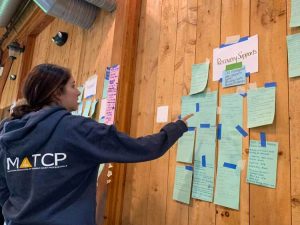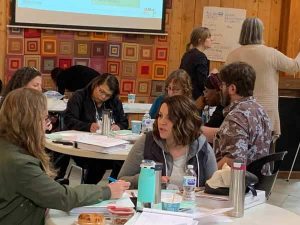 Since November 2018, dozens of representatives from Washtenaw-area organizations that are deeply involved in the prevention and treatment of substance use disorders (SUD) have been participating in an SUD system transformation process hosted by the Washtenaw Health Initiative. The goal? To improve the county’s SUD prevention and treatment system by identifying system barriers and weaknesses and then collectively working to overcome them.
Since November 2018, dozens of representatives from Washtenaw-area organizations that are deeply involved in the prevention and treatment of substance use disorders (SUD) have been participating in an SUD system transformation process hosted by the Washtenaw Health Initiative. The goal? To improve the county’s SUD prevention and treatment system by identifying system barriers and weaknesses and then collectively working to overcome them.
Six full-day convenings were held over a six-month period, and at the final transformation convening, which took place at Dawn Farm in Ypsilanti this May, seven cross-agency teams agreed to participate in a 100-day challenge to kick off the work and build momentum. Each team developed an agreed-upon series of action steps that members would take over the summer to begin to transform the county’s SUD prevention and treatment system.
The resident engagement team, for example, will explore how community organizations and agencies can work alongside residents with lived experience to improve the county’s SUD system transformation efforts. Over the next few months, the team will meet with organizations across the county to find out how they engage their clients in programmatic decision-making, whether they have surveyed clients about their needs and interests, and what they’ve learned from those surveys.
 The resident engagement group will use this information to collect feedback and advice from residents who are currently using substances, residents who are in substance use treatment, and residents who are in recovery. The hope is to ask current and former substance use treatment clients about the services they recommend and the best ways to deliver those services, then to use that feedback to inform future programming.
The resident engagement group will use this information to collect feedback and advice from residents who are currently using substances, residents who are in substance use treatment, and residents who are in recovery. The hope is to ask current and former substance use treatment clients about the services they recommend and the best ways to deliver those services, then to use that feedback to inform future programming.
The SUD needs identification team will catalog the county’s SUD screening tools as a first step toward developing a ‘no wrong door’ approach for providers across the county.
“Sometimes it’s confusing for health and human services providers to figure out which SUD services their clients need, and where to refer them for care,” says Lisa Gentz, program administrator, Washtenaw County Community Mental Health. “We’re hoping to develop a universal screening tool, and a decision tree that can go along with it, to open the door to the right level of care and make sure residents can access the programs and services that best meet their needs.”
The integrated service array team will map the county’s SUD prevention, treatment, and support services with the goal of developing a tool that allows residents and health and human services providers to easily understand their options and quickly access the services they require. And the eradicating stigma team will develop a directory of Michigan-based recovery community organizations so the team can gather input on effective anti-stigmatizing language that can be shared with health and human service providers across the state.

All of these teams (see full list below) will reconvene at the Washtenaw Health Initiative’s September 25 stakeholder meeting to share early accomplishments and discuss next steps. Please join us in thanking the individuals and organizations who are moving this work forward. And if you were unable to participate in the May convening, but would like to contribute to this important work, we would be thrilled to hear from you.
Aftercare and reengagement team
- Ayse Buyuktur, Washtenaw Health Initiative SIM
- Mark Creekmore, NAMI Washtenaw
- Danielle Parker, Michigan Medicine Complex Care Management Program
- Molly Smith, Avalon Housing
- Katie Wolfe, Home of New Vision
Common coordinated intake team
- Shannon Ellis, Washtenaw County Community Mental Health
- Kayla Kristy, Home of New Vision
- Jen MacLeod, Corner Health Center
- Melisa Tasker, Washtenaw County Community Mental Health
- Lauren Velez, Avalon Housing
Eradicating stigma team
- Norman Herbert, Washtenaw Health Initiative
- Carrie Rheingans, Washtenaw Health Initiative / Center for Health and Research Transformation (CHRT)
- Aileen Vazquez, Home of New Vision
- Molly Welch Marahar, Center for Health and Research Transformation (CHRT)
Integrated array of supports team
- Glynis Anderson, Home of New Vision
- Suzie Antonow, St. Joseph Mercy Ann Arbor
- Nancy Baum, Center for Health and Research Transformation (CHRT)
- Ebony Curry, Washtenaw Health Plan / Washtenaw Health Initiative SIM
- Gregory Powers, Center for Health and Research Transformation (CHRT)
- Marianne Udow-Phillips, Center for Health and Research Transformation (CHRT)
Resident engagement team
- Lizzy Adeleye, Washtenaw County Health Department
- Tim Florence, Washtenaw County Community Mental Health
- Charles Graham, Michigan Medicine UMATS
- Jeremy Lapedis, Center for Health and Research Transformation (CHRT) / Washtenaw Health Initiative SIM
- John Shovels, Washtenaw County Community Mental Health
Shared values team
- Nicole Adelman, Community Mental Health Partnership of Southeast Michigan
- Anna Byberg, Dawn Farm
- Audrey Hazelbaker, Washtenaw County Community Mental Health / Michigan Opioid Collaborative
- Katie Hoener, Washtenaw County Community Mental Health
- Ruth Kraut, Washtenaw Health Plan
- Julie Leonard, Hope Clinic
- Margy Long, Success by 6 Great Start Collaborative / Washtenaw Intermediate School District
- Eve Losman, Michigan Medicine Emergency Department
- Jason Schwartz, Dawn Farm
- Versell Smith, Corner Health Center
- Curtis Thornton, Home of New Vision
- Ross Zini, Dawn Farm
SUD needs identified team
- Chelsea Brodfuehrer, 14B District Court
- Michaela Buckhannon, St. Joseph Mercy Chelsea
- Lisa Gentz, Washtenaw County Community Mental Health
- Shauna Gulliver, Home of New Vision
- Shad Jordan, Washtenaw County Community Mental Health
- Joshua Meisler, Growth Works
- Curtis Thornton, Home of New Vision
